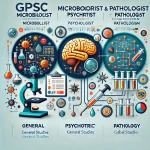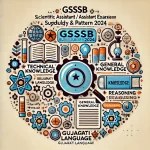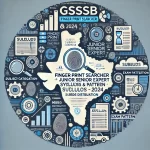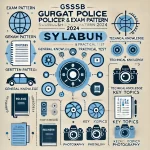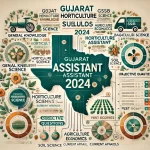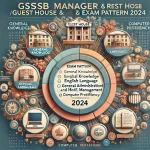Gujarat Public Service Commission (GPSC) will going to conduct Principal (Class-2) prelim examination to recruit qualified candidates for the role of principal in Gujarat’s skill training services, under State Labour and Employment Department.
The article explains GPSC principal syllabus 2024 and its examination pattern or scheme. It provides a detailed overview of the Gujarat Principal (Class-2) Syllabus and its Prelims Exam Pattern for 2024.
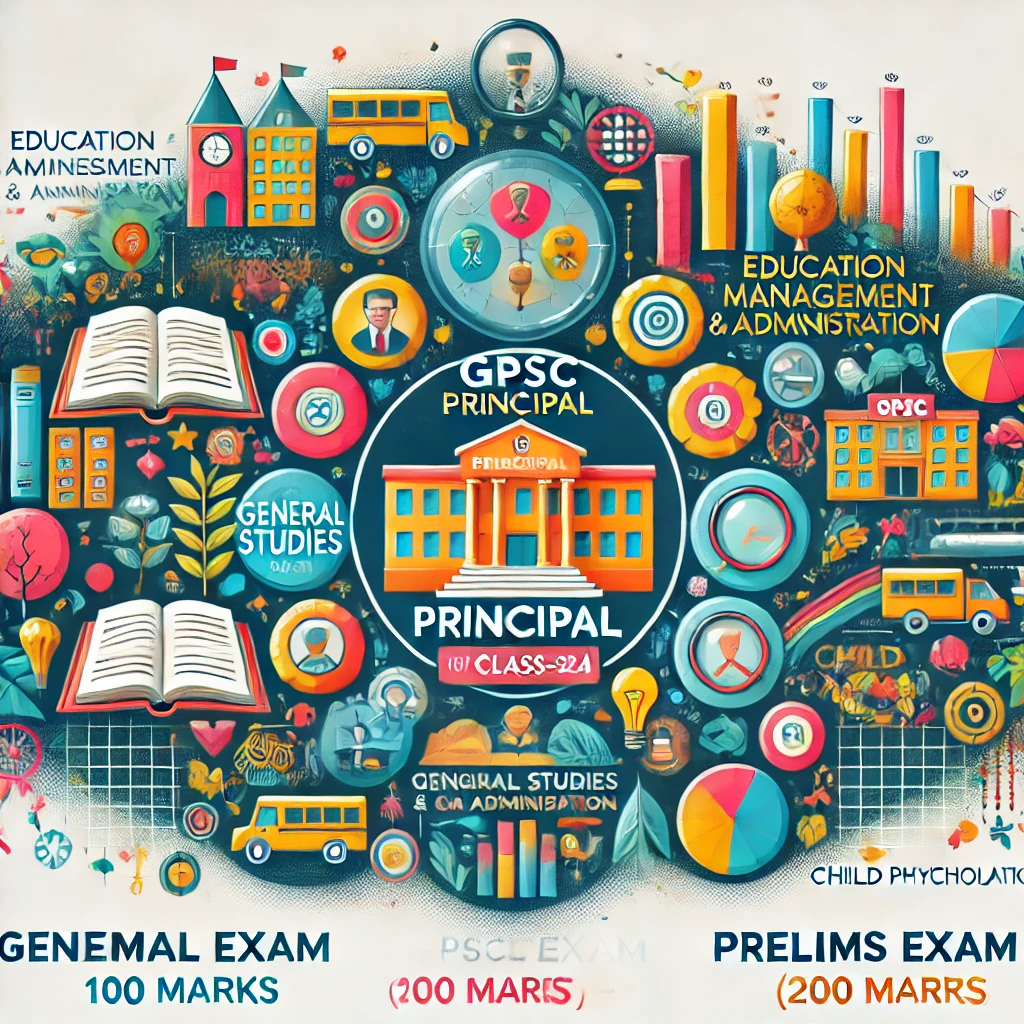
Contents
GPSC Principal (Class-2) Exam Pattern 2024
The selection process for the GPSC Principal (Class-2) involves two main stages: Preliminary Examination and Interview.
| Recruitment Conducted By | Gujarat Public Service Commission (GPSC) |
| Name of Post | Principal, Class-2, Gujarat’s Skill Training Services |
| No of Vacancies | 60 Posts |
| Category | Syllabus & Pattern |
| Advertisement No. | 13/2024-25 |
| Salary | Pay Matrix Level No. 8 (Rs. 44,900/- to 1,42,400/-) |
| Expected Exam Date | October 2024 |
| Selection | Preliminary Exam & Interview |
| Merit Weightage | 50% Preliminary Exam & 50% Interview |
| Official Website | gpsc.gujarat.gov.in |
GPSC Principal (Class-2) Preliminary Pattern
The preliminary exam is the first step in the selection process. It consists of objective-type multiple-choice questions (MCQs) designed to assess a candidate’s knowledge and understanding of general subjects.
- Type of Exam: Objective (Multiple Choice Questions)
- Part-1: General Studies (Medium: Gujarati and English) (100 Marks)
- Part-2: Technical Paper (Medium: English) (200 Marks)
- Duration: 3 hours (180 Minutes)
- Maximum Marks: 300 marks
- Subjects: General Studies: 100 marks, Technical Paper: 200 marks
- Negative Marking: -0.3 Marks for each wrong answer. +1 mark for each right answer.
| Paper | Subject | Marks |
| Preliminary Exam Part-1 | General Studies | 100 |
| Preliminary Exam Part-2 | Technical Paper | 200 |
| PRELIMS TOTAL | 300 | |
| INTERVIEW | 100 | |
| GRAND TOTAL | 400 | |
Important Links
- Must See: GPSC Assistant Engineer (Mechanical) Syllabus 2024 [Narmada Water Supply]
- For Latest GPSC Updates:- https://4syllabus.in/tag/gpsc
- Latest GSSSB Updates:- https://4syllabus.in/tag/gsssb
- For Latest Government Jobs in Gujarat:- https://4syllabus.in/tag/gujarat/
- Official GPSC Website:- https://gpsc.gujarat.gov.in
GPSC Principal (Class-2) Syllabus 2024 General Studies (100 Marks)
- Geography of India – Geographical, Economic, Social, Natural Resources and Population related topics – With Special reference to Gujarat
- Cultural Heritage of India – Literature, Arts, Religion and Architecture – With Special reference to Gujarat
- History of India- With Special reference to Gujarat
- Indian Economy and Planning
- Indian Politics and Constitution of India:
- Preamble
- Fundamental Rights and Fundamental Duties
- Directive Principles of State Policy
- Composition of Parliament
- Powers of the President of India
- Powers of Governor
- Judiciary
- Provisions for Scheduled Casts, Scheduled Tribes and Backward Classes of the society
- NITI Aayog
- Constitutional and Statutory Bodies: Election Commission of India, Comptroller and Auditor General, Information Commission.
- 06 General Science, Environment and Information & Communication Technology
- 07 Daily events of Regional, National and International Importance including Sports
- 08 General Mental Ability Test
- Logical Reasoning and Analytical Ability
- Number Series, Coding-Decoding
- Questions about relationship.
- Shapes and their Sub-sections, Venn Diagram
- Questions based on Clock, Calendar and Age
- Number system and order of Magnitude
- Linear Equations – in one or two Variables
- Ratio, Proportion and Variation
- Average of Mean, Median, Mode- including weighted Mean
- Power and Exponent, Square, Square Root, Cube Root, H.C.F. & L.C.M.
- Percentage, Simple and Compound Interest, Profit and Loss
- Time and Work, Time and Distance, Speed and Distance
- Area and Perimeter of Simple Geometrical Shapes, Volume and Surface
- Area of Sphere, Cone, Cylinder, Cubes and Cuboids
- Lines, Angles and Common geometrical figures – properties of transverse or parallel lines, properties related to measure sides of a triangle,
- Pythagoras theorem, quadrilateral, rectangle, Parallelogram and rhombus.
- Introduction to algebra-BODMAS, simplification of weird Symbols.
- Data interpretation, Data Analysis, Data sufficiency, Probability
09 Gujarati Grammar (ગુજ૨ાતી માધ્યમ-Gujarati Medium Only)
- (૧) જોડણી
- (૨) સમાનાર્થી-વિરૂધ્ધાર્થી શબ્દો
- (૩) રૂઢિપ્રયોગો અને કહેવતો
- (૪) સમાસ
- (૫) સંધિ
- (૬) અલંકા૨
- (૭) છંદ
10 English Grammar
- Articles, Pronouns, Adjectives, Prepositions, Conjunctions and Question tag.
- Verb and Tense, Agreement between subject and verb, Gerund, Participles.
- Modal auxiliaries. Usage of can, may, could, should, etc.
- Use of some, many, any, few, a little. Since and for.
- Active and passive voice
- Degrees of adjectives.
- Common errors of usage.
Part-2 Technical Subject Syllabus (200 Marks)
- Basic elements of physics and chemistry.
- Engineering graphs and design, Engineering drawings.
- Important Engineering Material and strength of material.
- Elements of Mechanical Engineering: Introduction, Prime movers, Sources of energy, Types of prime movers, Force and mass, Pressure, Work, Power, Energy, Heat, Temperature, Units of heat, Specific heat capacity, Interchange of heat, Change of state, Mechanical equivalent of heat, Internal energy, Enthalpy, Entropy, Efficiency, Statements of Zeroth Law, First law and Second Law of Thermodynamics. Theory of Machines. Mechanics of Solids.
- Merchant force analysis, Taylor’s tool life equation, machine ability and machine economics, rigid small and flexible automation, NC, CNC. Recent machining methods. Production planning and control, forecasting-moving average, exponential smoothing, Operation Scheduling, assembly line balancing, product development, Break even analysis, Capacity planning PERT and CPM.
- Control Operations. : Inventory control, ABC analysis, EOQ models, material requirement planning, job design, job standards, work measurement, quality management, quality analysis and control. IC Engines, Fuels and Combustion. Heat Transfer, Refrigeration and Air Conditioning. Turbo Machines and Power Plants. Workshop/manufacturing practices.
- Elements of Electrical Engineering: D.C. Circuits: – Effect of Temperature upon Resistance, Solutions of series, parallel in brief, star-delta combination of Resistances, KVL & KCL. AC Circuits, transformers, Electrical Machines, Power Converters.
- Electrical Wiring: Connectors & switches, system of wiring, domestic wiring installation, sub circuits in domestic wiring, simple control circuit in domestic installation, industrial electrification.
- Illumination: Types of lamps, fixtures & reflectors, illumination schemes for domestic, industrial & commercial premises, Lumen requirements for different categories. Safety & protection: Safety, electric shock, first aid for electric shock other hazards of electrical laboratories & safety rules, use of multi meters, grounding, importance of grounding, equipment of grounding for safety. Circuit protection devices, fuses, MCB, ELCB & relays. Electrical Installations. Electricity and magnetism, Power electronics.
- Elements of Automobile Engineering: Conventional Manufacturing Process, Kinematics and Dynamics of Machine, Inversion: Four bar chain mechanism, Flexible power transmission system, Geometrical configuration, Gyroscope, cam profile, sound and vibrations and mechanical system. Balancing: Dynamic balancing, rotor balancing, etc.
- Vehicle Dynamics: Understanding of vehicle dynamics, Dynamics load in moving vehicle, Tyres, Acceleration performance of vehicle, Braking System, Suspension system, steering system, road loads, and ride. Two and Three Wheel Technology Extended To Four Wheel Technology.
- Transmission System. Gear Study and Design of Different Types of Gears. Study of Gear Train. Frame and Body of the Vehicle. Electrical System and Instrumentations used in vehicles. Automotive System Design. Automobile Air Conditioning: Alternate Fuels and Engine. Transport Management and Laws, Total Quality Management (TQM).
- Elements of Civil Engineering:- Scope of Civil Engineering: Introduction, Impact of Infrastructural Development on the Economy of a Country, Role of Civil Engineers, Importance of Planning, Scheduling and Construction Management. Surveying: Introduction, Linear measurements, Compass surveying, Elevation measurements, Areas and volumes, Modern Tools of Surveying and Mapping.
- Construction Materials: Requirement, types, uses, properties and importance of Civil Engineering materials like Stone, Bricks, Lime, Cement, Ferrous and Non Ferrous Metals, Ceramic Materials, Timber, Sand, Aggregate, Mortar and Concrete, Paints and Varnishes, Glass, Plastic. Elements of Building Construction: Planning: Elementary principles and basic requirements of a building planning, layout of residential & industrial buildings. Introduction to Plan, Elevation & Section of Residential Building.
- Construction: Classification of buildings based upon occupancy and structure, Design Loads, Common building components, their functions, and nominal dimensions. Elements of building drawing, Introduction to building byelaws.
- Various instruments for measurement (i.e. temperature, pressure, flow etc.)
- Elements of Computer and IT Engineering: Introduction, Basic block Diagram and functions of various components of computer. Concept of Hardware and Software. Concept of basic types of software.
- Introduction to programming and programming languages. Flow charts and algorithms. Computer aided Design (CAD), Supervisory control and Data Acquisition (SCADA). Application of E-Governance and ICT in Industries.
- Basic Electronics including Programmable Logic Controllers (PLC)
- Entrepreneurship Development:- Entrepreneurship and economic development: its importance, Role of entrepreneurship, entrepreneurial environment. Constitutional Support and Framework for Entrepreneurship: Institutions – All India, State Level and Fund- Based, Supporting Policies of Entrepreneurship, Industrial Policy, Fiscal Incentives, Measures for Promotion and Development of Entrepreneurs. Role and functions of Industrial Training Institutions (ITI) and Industrial Kaushalya Vardhan Kendra (IKVK).
- Organisational setup and functions of various departments/ divisions/ institutions/ boards under Ministry of Skill Development and Entrepreneurship, Ministry of Labour, Gujarat Government Labour and Employment Department.
- Various Government Schemes and Acts: Craftsman’s Training Scheme, Role and functions of National Council for vocational training (NCVT) and Gujarat Council for vocational training (GCVT).
- Apprenticeship Training Scheme (ATS), Modular Employable Scheme, Objectives and Guidelines of Apprentice Act, 1961. Various schemes of Ministry of Skill Development and Entrepreneurship, Ministry of Labour, Gujarat Government Labour and Employment Department.
- Current Trends and Recent developments in Skill training.
GPSC Principal Interview Questions (Examples)
- What leadership style do you follow, and how would you implement it to improve the performance of both teachers and students in your institute? Objective: To assess your leadership and management style and how effectively you can motivate and guide your staff and students.
- How would you handle a situation where there is a conflict between two teachers or between a teacher and a parent? Objective: To gauge your conflict resolution skills and your ability to maintain a positive school environment.
- What is your approach to integrating new educational policies, such as the National Education Policy (NEP), in your training institute? Objective: To evaluate your understanding of current educational policies and your strategic thinking in implementing them.
- How do you plan to address the needs of students with diverse learning abilities, including those with special educational needs? Objective: To determine your awareness of inclusive education practices and how you plan to accommodate diverse learners.
- What steps would you take to improve the quality of education and overall performance in a low-performing school? Objective: To test your problem-solving skills, your understanding of educational quality improvement, and how you plan to boost academic performance.
Candidates must prepare thoroughly for both the preliminary exam and the interview to secure their job in the given recruitment process.
By understanding the exam pattern and focusing on important topics, candidates can improve their chances of success. In case of any doubt or suggestion, please use the comment section below. Best of Luck.
Important FAQS
What topics are covered in the General Studies section?
The General Studies section includes:
- Indian Polity and Constitution
- Indian Economy
- Current Affairs (National and International)
- History and Culture of Gujarat and India
- Environmental and General Science topics
What is the weightage of marks in GPSC Principal recruitment process?
The interview carries 50% and Prelims carry 50%.
Is there negative marking in Prelims?
Yes, 0.3 marks as usual for each wrong answer.
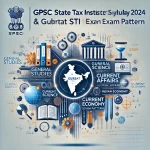
![GPSC Assistant Engineer (Mechanical) Syllabus 2024 & Exam Pattern [Narmada Water Supply]](https://4syllabus.in/wp-content/uploads/2024/09/GPSC-Assistant-Engineer-Mechanical-Syllabus-2024-Exam-Pattern-Narmada-Water-Supply-150x150.webp)
